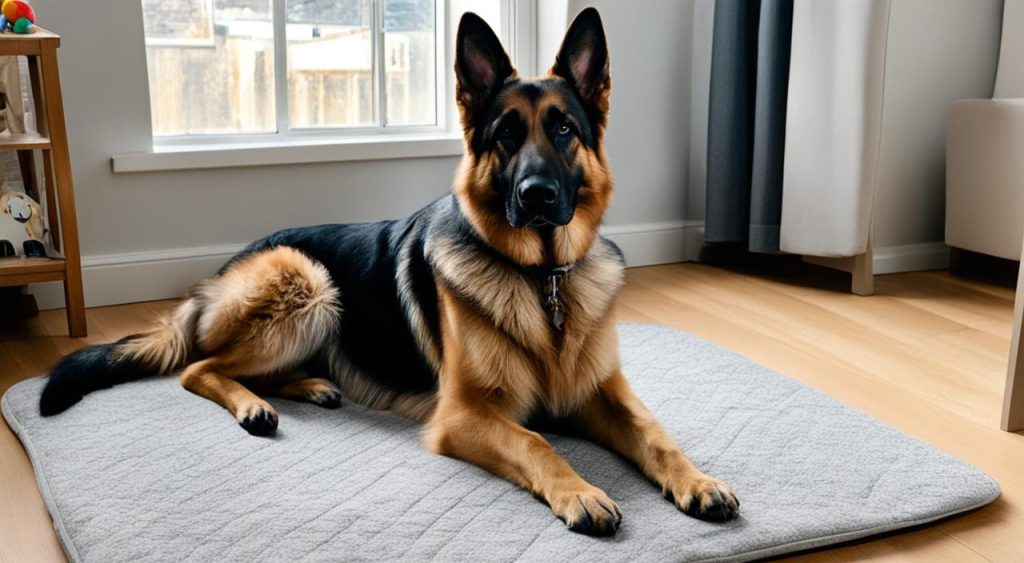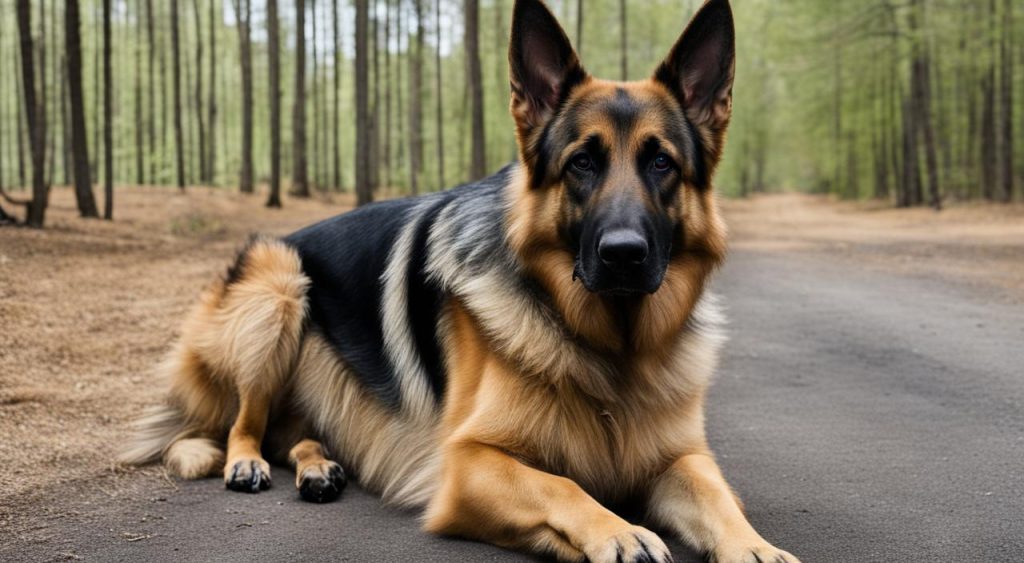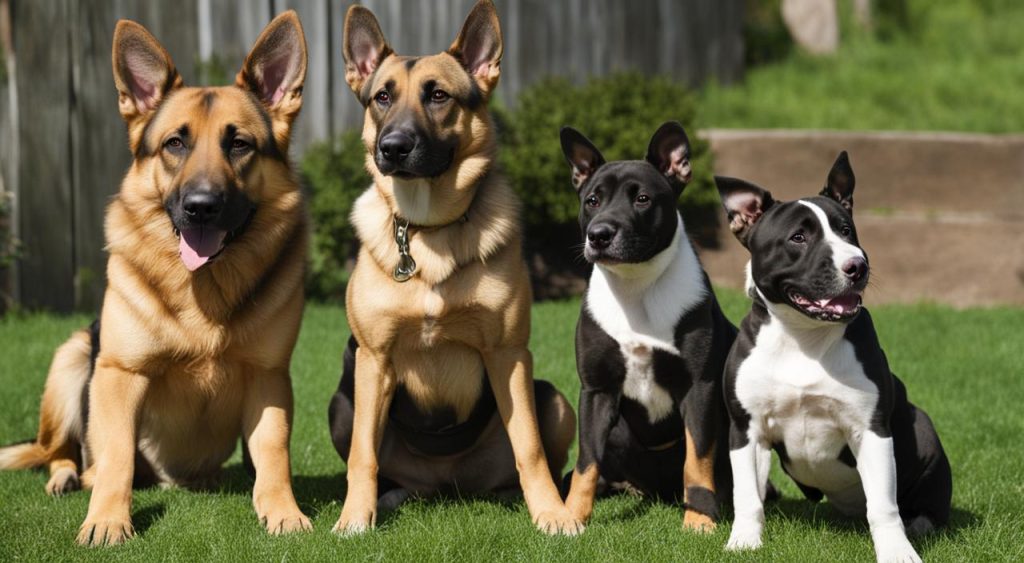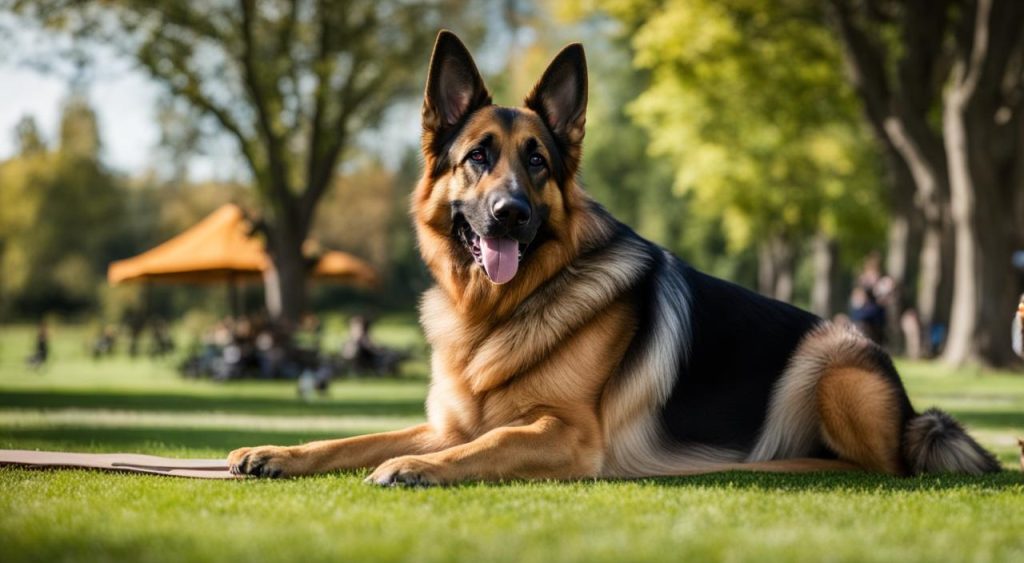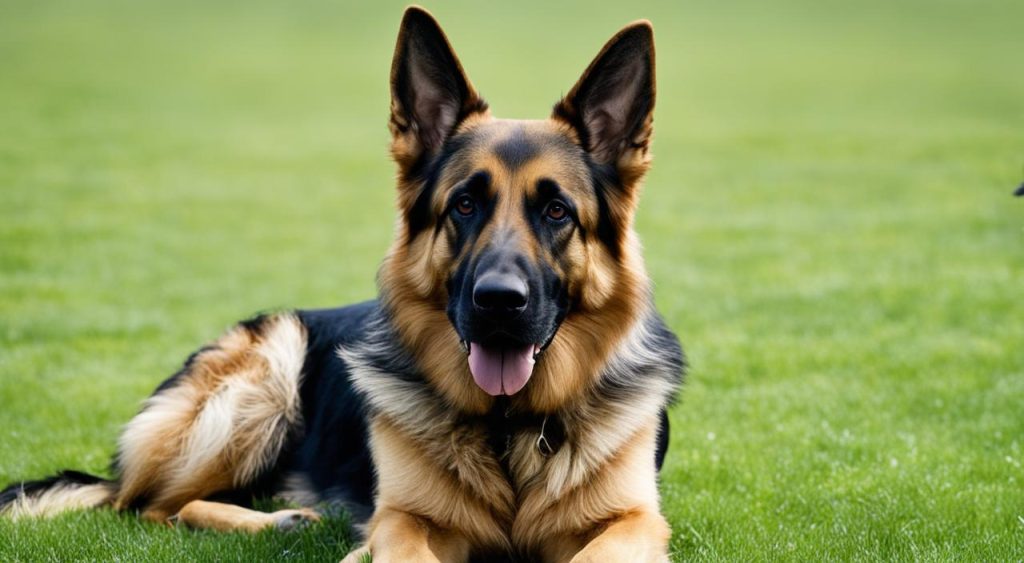German Shepherds are highly intelligent and loyal dogs known for their protective nature and versatility. If you’re considering getting a German Shepherd, it’s important to understand their needs, including their alone time requirements.
German Shepherds should not be left alone for extended periods, as they are social animals that thrive on human interaction. Leaving them alone for too long can lead to boredom and potentially result in destructive behavior such as digging, chewing, and excessive barking.
It is recommended to limit their alone time to a maximum of 8 hours a day. However, shorter periods are preferable to ensure their mental and physical well-being. Engaging in regular exercise, such as brisk walks or playtime, is essential for German Shepherds to release their energy and prevent boredom.
Additionally, German Shepherds have a double coat that requires regular brushing to prevent shedding and maintain their coat’s health. While they usually get along well with children, their compatibility with cats may vary depending on their individual temperament and early socialization experiences.
To establish boundaries and provide a safe space for your German Shepherd, crate training can be beneficial. It gives them a sense of security and teaches them to be independent when necessary. If you’re considering getting a German Shepherd, adoption from shelters or rescues is encouraged, as it gives a deserving dog a second chance at a loving home.
Key Takeaways:
- German Shepherds should not be left alone for more than 8 hours a day.
- They require regular exercise to prevent boredom and destructive behavior.
- German Shepherds have a heavy undercoat that needs regular brushing.
- Compatibility with cats may vary depending on the individual dog and cat’s temperament.
- Crate training can be beneficial to establish boundaries and create a safe space for German Shepherds.
How Long Can a German Shepherd Be Left Alone?
The amount of time a German Shepherd can be left alone varies depending on factors such as their age, training, and overall health. It is important to consider these factors to ensure the well-being and happiness of your furry companion.
For puppies, it is recommended not to leave them alone for more than 1-2 hours at a time. Puppies require more attention, care, and supervision as they are still developing their bladder control and may need frequent bathroom breaks.
Adult German Shepherds, on the other hand, can tolerate being alone for longer periods. They can typically handle 4-8 hours of alone time. However, it’s important to note that every dog is unique, and some German Shepherds may have higher or lower tolerance levels.
Adolescent German Shepherds are in a transitional phase and should not be left alone for more than 4 hours. They still require supervision and guidance during this stage of their development.
Senior German Shepherds may have special needs and may require more frequent bathroom breaks and attention. Their ability to hold their bladder for extended periods may decrease with age. It is crucial to address their individual needs when determining their alone time limits.
When considering how long your German Shepherd can be left alone, it is essential to assess their behavior and tendencies. German Shepherds are known to be highly intelligent and sociable dogs. Some may experience separation anxiety when left alone for extended periods. Separation anxiety can manifest through destructive behavior, excessive barking, or other signs of distress.
To ensure your German Shepherd is comfortable and happy during their alone time, consider providing them with mental stimulation, such as puzzle toys, and leaving them with a safe and comfortable space, such as a crate or designated area in your home.
Remember, the well-being of your German Shepherd should always be a top priority. If you have concerns or are unsure about leaving your dog alone, consult with a professional dog trainer or veterinarian who can provide specific guidance based on your German Shepherd’s individual needs and personality.
Tips for leaving your German Shepherd alone
Leaving your German Shepherd alone can be a challenging task, but with the right strategies and preparations, you can ensure their well-being and minimize any potential stress or anxiety. Here are some tips to help make the experience smoother:
-
Establish a schedule: Creating a routine for your German Shepherd’s meals, walks, and playtime can provide them with structure and predictability. This can help ease their anxiety and make them feel more secure while you’re away.
-
Provide background noise: Leaving the TV or radio on can help mask any external sounds and provide some comforting background noise. This can create a more familiar environment for your German Shepherd and help them feel less alone.
-
Consider hiring a dog walker or sitter: If your schedule allows for it, hiring a professional dog walker or dog sitter can provide your German Shepherd with much-needed company and exercise during the day. Knowing that someone is checking in on them can provide you with peace of mind as well.
-
Enroll your dog in training classes: Keeping your German Shepherd mentally stimulated is crucial when they are left alone. Consider enrolling them in training classes or engaging them in interactive toys or puzzles to keep their minds occupied and prevent boredom.
-
Play calming music: Classical music has been known to have a soothing effect on dogs. Playing some soft, classical tunes in the background can help create a calming atmosphere for your German Shepherd while they are alone.
-
Crate train your dog: Crate training can provide your German Shepherd with a safe space and boundaries. Make sure to introduce the crate gradually and make it a positive and comfortable environment for them. A crate can give them a sense of security when you’re not around.
-
Consider getting another dog: If possible, adding another dog to your household can provide your German Shepherd with a companion. This can help alleviate their loneliness and provide them with social interaction while you’re away.
-
Use smart home technology: Taking advantage of smart home technology, such as cameras or interactive toys, can help you monitor your German Shepherd and even interact with them remotely. This can provide reassurance and help you stay connected with your furry friend.
-
Make mid-day visits or ask for assistance: If feasible, try to arrange mid-day visits home to check on your German Shepherd or ask a trusted neighbor, friend, or family member to drop by and spend some time with them. The additional human interaction can help break up the day for your dog.
By following these tips, you can help alleviate separation anxiety, provide a stimulating environment, and keep your German Shepherd content while they are alone. Remember, each dog is unique, so it’s essential to observe their behavior and adjust your strategies accordingly.
Conclusion
While German Shepherds may prefer not to be left alone, they are capable of handling some amount of alone time. The duration they can tolerate being left alone depends on factors such as their age, training, and overall health. It is crucial to take into account their individual temperament and behavior when determining the appropriate length of time.
By following the tips provided in this article, you can create a positive environment for your German Shepherd while they are alone, thus minimizing potential separation anxiety and behavioral issues. Setting up a consistent schedule, providing mental stimulation, incorporating background noise, and considering the use of modern technology can all contribute to their well-being.
Always prioritize your German Shepherd’s well-being and happiness. If you have concerns about leaving your dog alone or suspect they may be experiencing separation anxiety, it is recommended to consult with a professional, such as a veterinarian or animal behaviorist, who can provide expert guidance tailored to your specific situation.

